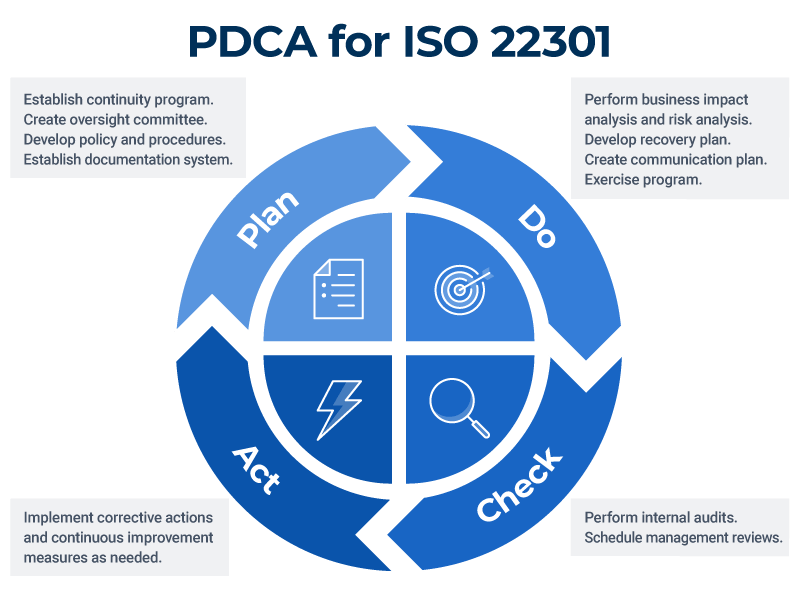ISO 22301 Compliance
This standard is crucial for organizations to enhance their resilience against various unforeseen disruptions, ensuring continuity of operations and services.

What is ISO 22301?
ISO 22301 sets out the requirements for establishing, implementing, operating, monitoring, reviewing, maintaining, and continually improving a Business Continuity Management System (BCMS).
Its core purpose is to help organizations prepare for, respond to, and recover from disruptive incidents effectively. By implementing a structured BCMS based on ISO 22301, organizations can ensure that their critical business functions can continue to operate within acceptable timeframes during and after a disruption, minimizing potential damage.
The standard follows the Plan-Do-Check-Act (PDCA) cycle, promoting a continuous process of improvement in business continuity capabilities
Key Elements of an ISO 22301
Implementing a BCMS based on ISO 22301 involves several key components and activities:
-
Context of the Organization: Understanding the organization's environment, needs, and expectations of interested parties relevant to business continuity.
-
Leadership: Demonstrating top management commitment and establishing the BCMS policy and roles.
-
Planning: Identifying risks and opportunities, setting business continuity objectives, and planning for changes.
-
Support: Providing the necessary resources, competence, awareness, and communication for the BCMS.
-
Operation: This key clause includes crucial activities such as Business Impact Analysis (BIA), Risk Assessment, developing business continuity strategies and plans, and conducting exercises and testing.
-
Performance Evaluation: Monitoring, measuring, analyzing, evaluating, and auditing the BCMS's performance.
-
Improvement: Addressing nonconformities and continually enhancing the BCMS.
The Business Impact Analysis (BIA) and Risk Assessment are foundational activities within ISO 22301, identifying critical activities, their dependencies, the potential impact of disruptions, and the risks that could cause those disruptions.

Advantages of Implementing ISO 22301

Implementing an ISO 22301-aligned BCMS offers numerous strategic and operational advantages:
-
Ensured Business Continuity: The primary benefit is the enhanced ability to continue delivering products and services within acceptable timeframes during and immediately after a disruptive incident.
-
Minimized Financial and Reputational Damage: Effective business continuity planning and response reduce downtime, mitigate financial losses, and protect your organization's brand reputation and stakeholder trust.
-
Improved Risk Management: ISO 22301 provides a systematic framework for identifying, analyzing, and treating risks that could lead to disruptive events, strengthening your overall risk management posture.
-
Meeting Stakeholder Expectations and Regulatory Requirements: Compliance demonstrates a commitment to resilience, satisfying the expectations of customers, partners, and investors, and helping to align with business continuity requirements found in various regulations.
-
Gaining a Competitive Advantage: Organizations with a certified ISO 22301 BCMS can differentiate themselves in the market, showcasing their reliability and preparedness, which can be a key factor in winning new business.
Who Should Comply?
While ISO 22301 is a voluntary standard, its implementation is highly recommended and beneficial for organizations across all sectors and sizes, particularly those where the continuity of operations is critical. This includes:
-
Organizations in Critical Sectors: Entities in finance, healthcare, telecommunications, government, energy, and transport, where disruptions can have widespread and severe consequences.
-
Organizations with Complex Operations or Supply Chains: Businesses with intricate processes or dependencies on numerous suppliers, where a disruption in one area can have a cascading effect.
-
Organizations Handling Sensitive Data or Providing Essential Services: Companies that process confidential information or deliver services that are vital to customers or the public.
-
Organizations Seeking to Minimize the Impact of Disruptions: Any business that wants to reduce potential financial losses, reputational damage, and operational downtime caused by unforeseen events.
-
Organizations Needing to Demonstrate Resilience: Businesses that must assure customers, partners, regulators, or investors of their ability to maintain operations during challenging circumstances.
Need more details? Review the ISO 22301:
If you cannot find what you want, please visit the ISO website
You can also read other related documents:
-
ISO 22313:2020 Security and resilience — Business continuity management systems — Guidance on the use of ISO 22301
Remember you can always refer to ISO website for updates.
Let Us Help You Comply
Cyberatos is your experienced partner in navigating the requirements of ISO 22301 and enhancing your organization's business continuity capabilities.
Partner with CyberAtos to build a resilient organization that can effectively withstand disruptions. Our expertise in risk management and ISO 22301 can help you achieve compliance, protect your operations, and enhance confidence among your stakeholders.



